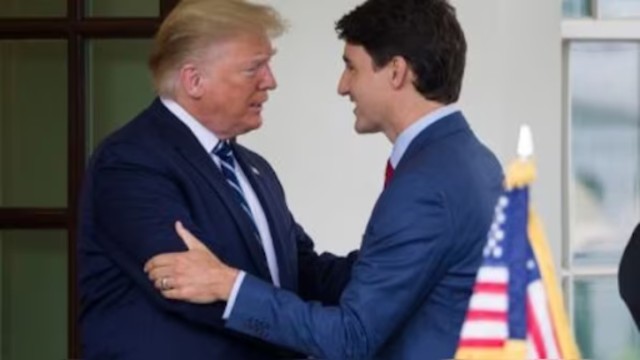
US President Donald Trump and Canadian Prime Minister Justin Trudeau. AP File
A top adviser to Donald Trump has denied claims that Canada could be removed from the Five Eyes intelligence-sharing alliance. However, experts warn that Canada’s security relationship with the U.S. could face challenges in the coming months.
The Five Eyes alliance includes the U.S., Canada, the U.K., Australia, and New Zealand. These countries share intelligence to protect national security. A recent report suggested that Trump’s adviser, Peter Navarro, proposed removing Canada from the group to pressure the country, which Trump has talked about annexing as the “51st state.”
Navarro denied these claims, saying the U.S. would never risk its national security by cutting ties with allies like Canada. But security experts believe the situation is still concerning.
Stephanie Carvin, a former national-security analyst, said there have been rumors about the U.S. removing Canada from the alliance. She pointed out that Trump has repeatedly threatened Canada with trade tariffs, adding that this latest issue fits with his approach toward Ottawa.
A defense expert recently wrote that American officials had threatened to remove Canada from Five Eyes. While this could have been an empty threat, it highlights tensions between the two countries.
The U.S. plays the biggest role in the Five Eyes alliance. If Canada were removed, it would lose access to critical intelligence, making it more vulnerable to foreign threats. China, Russia, and even India, which has closer ties with Trump’s administration, could take advantage of Canada’s weakened intelligence network.
Richard Kerbaj, an expert on intelligence agencies, said Canada is valuable to Five Eyes because of its ability to gather intelligence on China’s global activities. This makes Canada a key partner for the U.S. in countering Beijing.
In the past, the U.S. has restricted intelligence-sharing with Canada. In 2003, when Canada refused to support the U.S.-led war in Iraq, Washington temporarily limited the information it shared with Ottawa.
Security experts argue that the U.S. would also suffer if Canada was removed from Five Eyes. Canada provides crucial intelligence from the Arctic and Latin America, which the U.S. relies on.
Thomas Juneau, a professor at the University of Ottawa, acknowledged that Canada needs to strengthen its security efforts. However, he emphasized that Canada plays a vital role in the Five Eyes alliance, particularly in signals intelligence, which involves monitoring electronic communications.
Juneau also warned that Trump’s administration could put intense pressure on Canada in the coming months. He said the U.S. might use threats to remove Canada from Five Eyes as a bargaining tool. Even if Canada isn’t expelled, the U.S. could limit the intelligence it shares.
Carvin believes that far-right Trump supporters could create instability in U.S. intelligence agencies. If that happens, Canada’s security could be affected.
Some officials in the U.S. intelligence community view Canada as a weaker partner in Five Eyes. Others believe that Canada’s role in the Arctic and its intelligence-sharing capabilities are too valuable to lose.
Experts agree that Canada and the U.S. will likely face growing tensions over security issues, trade, and military cooperation in the near future.















